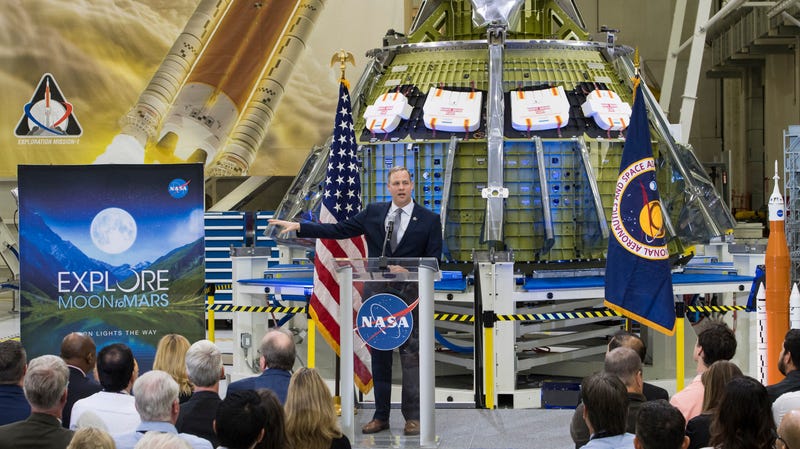
NASA is requesting an additional $1.6 billion in funding for next year to accelerate its manned mission to the Moon by 2024, which the agency revealed will be titled Artemis, the New York Times reported on Monday.
Per CNN, NASA emphasized that the agency plans to have the first female astronaut to set foot on the lunar surface on the Artemis crew. $1 billion of the request would go directly to the “commercial” lunar lander, CNN wrote, while $651 million would be allocated to the development of the Orion Multi-Purpose Crew Vehicle and the repeatedly delayed Space Launch System, NASA’s in-house rocket program to replace the retired Space Shuttle. “Fifty years after Apollo, the Artemis program will carry the next man and first woman to the moon,” NASA Administrator Jim Bridenstine said during a press call.
The request is subject to congressional approval and, as the Times noted, follows Vice President Mike Pence’s March announcement-slash-threat that the White House wants NASA to have astronauts back on the Moon by 2024 instead of 2028 or face some kind of unspecified reorganization. The former date conveniently falls within a theoretical two-term, 77-78-year-old Donald Trump’s last full year in office (something Bridenstine acknowledged as lowering “political risk” that the project would be suddenly abandoned).
Trump himself first broke the news via Twitter.
Advertisement
Somewhere in the neighborhood of $220 million would also be set aside for the development of technologies crucial to expanding future U.S. lunar presence, the Times wrote:
NASA is also seeking $132 million for developing technologies like converting ice within craters at the moon’s poles to water and $90 million for robotic exploration of the moon.
Mr. Bridenstine said that even higher increases would be needed in future years and that NASA was still figuring how much that would be. He described the current request as a “down payment.”
Advertisement
That adds up to more than $1.6 billion, but NASA would offset some $321 million by shaving it off its prior request for $824 million to funding a lunar-orbiting space station named Gateway, another part of the Moon project. Bridenstine has said that project could be reduced to just two modules, ones for power and habitation.
$1.6 billion is not a horde of treasure by federal government standards. But it does effectively reverse Trump’s prior 2020 budget request of $21 billion for NASA, which would have been a year-over-year decrease of $500 million. NASA administrator Jim Bridenstine had already described the $21 billion request as sufficient to meet the 2028 date.
However, the lion’s share of the funding would come from unallocated money in the Pell Grant program, a financial aid program for low-income students, the Washington Post reported. The White House says that the program has a surplus of $9 billion due to decreased enrollment and no students would see reduced assistance as a result, though critics have asserted for years that taking away reserve funds would endanger its long-term viability and leave it struggling if there is a surge in demand.
Advertisement
This poses the risk of jeopardizing Democratic support for the stepped-up effort, which was already far from guaranteed. There is likely to be ample suspicion that 2024 is not a realistic date and that Trump just wants to subsidize promises of another moon landing in his second term with government money.
As Ars Technica reported, some external estimates for the program have come in at $6-8 billion annually until 2024. Bridenstine has characterized that number as too high, but University of Colorado astrophysicist Jack O. Burns told the Times his estimate was that NASA actually needs $25 billion annually to launch in 2024. Ars also noted that New York Representative José Serrano, who heads the House budget subcommittee in charge of NASA funding and is in his last term, has suggested in the past that the 2028 target is perfectly acceptable and that Trump is only accelerating the timeline so he can talk the project up before the 2020 elections.
The White House has also been rumored to be considering pushing for a “continuing resolution” to maintain 2019 levels of federal spending through fiscal year 2020, then again request a short-term extension to maintain those spending levels through November elections, according to Axios. Administration officials believe that would position them to push for gigantic cuts in the first year of Trump’s second term, but it could also spell doom for a moon landing in 2024.
Advertisement
https://gizmodo.com/nasa-wants-1-6-billion-to-send-first-woman-to-the-moon-1834741208
2019-05-14 12:31:00Z
52780295670766
Tidak ada komentar:
Posting Komentar